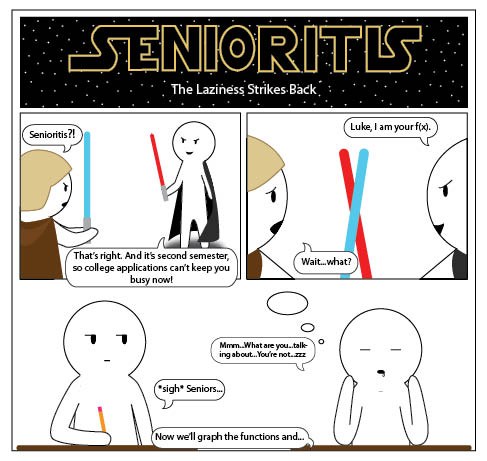As second semester rolls around, many students return to school rested from break and motivated by semester goals and New Year’s resolutions. Yet a different vibe courses through the veins of our eldest students. Instead of being ready for the new semester, many seniors find themselves developing feelings of apathy toward their education as “senioritis” hits like the flu.
Senioritis is a widespread epidemic for which symptoms range from little effort in schoolwork to poor attendance, and the only known cure is graduation. College applications have been turned in or future work forces have been eyed, and grades may, in the grand scheme of things, no longer seem to matter. Second semester feels like the time for seniors to celebrate the end of the college admission process and their high school careers; however, senioritis garners serious consequences for these incoming college students. In an acceptance letter, along with the word “congratulations,” admissions offices often include a part explaining the importance of maintaining the personal achievements that the student originally promised. Though colleges rarely rescind offers of admission after seeing dropping grades, senioritis leaves seniors unprepared for the rigor of college classes after so many months of taking it easy. In fact, in a 2001 report titled “The Lost Opportunity of Senior Year,” the National Commission on the High School Senior estimated one-third to one-half of seniors graduate unprepared for college or the work force, partly because they slack off during their senior year. In addition, seniors may find themselves scoring poorly on AP exams at the end of second semester and therefore unable to earn college credit.
Therefore, instead of slacking off, seniors should battle their apathy and boredom with creative experimentation. Unlike previous years when the results of a student’s education were examined under a microscope, the second semester of senior year gives space for creative freedom. Now is the perfect time for seniors to experiment with their study habits so they can bring the best ones to the college campus. Whether it is using visual aids, creating mnemonic devices, practicing with friends, switching study areas or creating simulations, experimenting with study habits can turn a potentially boring semester into an efficient one.
However, creative experimentation can go beyond just study habits. Youth-serving organizations such as the College Board and National Youth Service Council encourage seniors to try different ways to optimize their senior year, such as service-learning or experimental education through which students can have direct experience with the learning environment and the community. Such experimental education includes cooperative learning to gain experience assessing group needs or environmental education about natural environment relationships. Seniors will be able to take responsibility for their education and find different ways of learning that most interest them.
Administrators can help seniors stay in school and fight the drag of senioritis. Instead of continuing the usual lecturing and standardized testing that students are so tired of, teachers should vary their teaching styles to revive the interests of the students. They should give seniors a reason to stay in school and continue working instead of doling punishments when they do not. At this point, negative reinforcements like bad scores or detentions will do little to concern or benefit a senior. Instead, instructors should use tools like simulations, role-plays, games and stories to change the way students view education and turn written words into active experiences.
Another method that would steer clear of the traditional testing and memorizing is to have seniors write a university-style thesis during their second semester. By having seniors write a thesis, teachers also train their students how to research properly and transmit discoveries into cohesive writing that would greatly prepare them for writing papers in college.
The overarching treatments for senioritis are experimentation and diversity. Seniors should vary their study habits and learning experiences as much as teachers and administrators should try new methods to fight the seniors’ indifference to education. Laziness may seem like a comfortable route now, but seniors will pay for it when they step onto their college campuses.


































![AI in films like "The Brutalist" is convenient, but shouldn’t take priority [opinion]](https://hilite.org/wp-content/uploads/2025/02/catherine-cover-1200x471.jpg)









































![Review: “The Immortal Soul Salvage Yard:” A criminally underrated poetry collection [MUSE]](https://hilite.org/wp-content/uploads/2025/03/71cju6TvqmL._AC_UF10001000_QL80_.jpg)
![Review: "Dog Man" is Unapologetically Chaotic [MUSE]](https://hilite.org/wp-content/uploads/2025/03/dogman-1200x700.jpg)
![Review: "Ne Zha 2": The WeChat family reunion I didn’t know I needed [MUSE]](https://hilite.org/wp-content/uploads/2025/03/unnamed-4.png)
![Review in Print: Maripaz Villar brings a delightfully unique style to the world of WEBTOON [MUSE]](https://hilite.org/wp-content/uploads/2023/12/maripazcover-1200x960.jpg)
![Review: “The Sword of Kaigen” is a masterpiece [MUSE]](https://hilite.org/wp-content/uploads/2023/11/Screenshot-2023-11-26-201051.png)
![Review: Gateron Oil Kings, great linear switches, okay price [MUSE]](https://hilite.org/wp-content/uploads/2023/11/Screenshot-2023-11-26-200553.png)
![Review: “A Haunting in Venice” is a significant improvement from other Agatha Christie adaptations [MUSE]](https://hilite.org/wp-content/uploads/2023/11/e7ee2938a6d422669771bce6d8088521.jpg)
![Review: A Thanksgiving story from elementary school, still just as interesting [MUSE]](https://hilite.org/wp-content/uploads/2023/11/Screenshot-2023-11-26-195514-987x1200.png)
![Review: "When I Fly Towards You", cute, uplifting youth drama [MUSE]](https://hilite.org/wp-content/uploads/2023/09/When-I-Fly-Towards-You-Chinese-drama.png)
![Postcards from Muse: Hawaii Travel Diary [MUSE]](https://hilite.org/wp-content/uploads/2023/09/My-project-1-1200x1200.jpg)
![Review: "Ladybug & Cat Noir: The Movie," departure from original show [MUSE]](https://hilite.org/wp-content/uploads/2023/09/Ladybug__Cat_Noir_-_The_Movie_poster.jpg)
![Review in Print: "Hidden Love" is the cute, uplifting drama everyone needs [MUSE]](https://hilite.org/wp-content/uploads/2023/09/hiddenlovecover-e1693597208225-1030x1200.png)
![Review in Print: "Heartstopper" is the heartwarming queer romance we all need [MUSE]](https://hilite.org/wp-content/uploads/2023/08/museheartstoppercover-1200x654.png)




